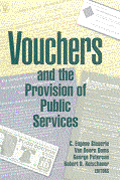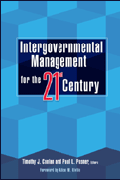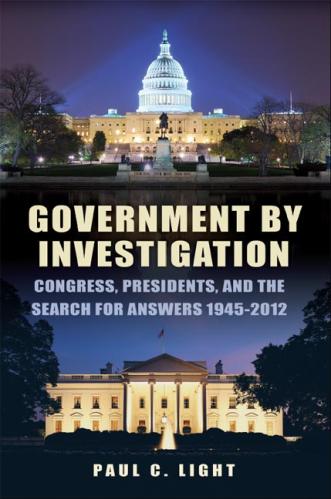


Book
A Brookings Institution Press and the National Academy of Public Administration publication America’s complex system of multi-layered government faces new challenges as a result of rapidly changing economic, technological, and...
America’s complex system of multi-layered government faces new challenges as a result of rapidly changing economic, technological, and demographic trends. An aging population, economic globalization, and homeland security concerns are among the powerful factors testing the system’s capacity and flexibility. Major policy challenges and responses are now overwhelmingly intergovernmental in nature, and as a result, the fortunes of all levels of government are more intertwined and interdependent than ever before. This volume, cosponsored by the National Academy of Public Administration (NAPA), defines an agenda for improving the performance of America’s intergovernmental system. The early chapters present the current state of practice in intergovernmental relations, including discussion of trends toward centralization, devolution, and other power-sharing arrangements. The fiscal underpinnings of the system are analyzed, along with the long-term implications of current trends in financing at all levels. The authors identify the principal tools used to define intergovernmental management–grants, mandates, preemptions—in discussing emerging models and best practices in the design and management of those tools. In tergovernmental Management for the 21st Century applies these crosscutting themes to critical policy areas where intergovernmental management and cooperation are essential, such as homeland security, education, welfare, health care, and the environment. It concludes with an authoritative assessment of the system’s capacity to govern, oversee, and improve. Contributors include Jocelyn Johnston (American University), Shelley Metzenbaum (University of Maryland), Richard Nathan (SUNY at Albany), Barry Rabe (University of Michigan), Beryl Radin (American University), Alice Rivlin (Brookings Institution), Ray Sheppach (National Governors Association), Frank Shafroth (George Mason University), Troy Smith (BYU–Hawaii), Carl Stenberg (University of North Carolina), Carol Weissert (Florida State University), Charles Wise (Indiana University), and Kenneth Wong (Brown University).
Related Books

C. Eugene Steuerle, Van Doorn Ooms, George E. Peterson, Robert D. Reischauer
June 1, 2000

Paul C. Light
October 22, 2013

Thomas E. Mann, Gary R. Orren
September 1, 1992
Authors
Edited by
Foreword by

Timothy J. Conlan is university professor of public and international affairs at George Mason University and a fellow of the National Academy of Public Administration. He is the author of From New Federalism to Devolution: Twenty-Five Years of Intergovernmental Reform (Brookings, 1998). His 1988 Brookings book New Federalism was selected by the American Political Science Association as its Best Book on federalism and intergovernmental relations. Paul L. Posner is a professor and director of the MPA program at George Mason University. He previously served as director of federal budget and intergovernmental relations issues at the U.S. Government Accountability Office. Posner is the author of The Politics of Unfunded Mandates: Whither Federalism? (Georgetown, 1998). Alice M. Rivlin is a senior fellow in Economic Studies at the Brookings Institution and visiting professor at the Georgetown Public Policy Institute. She has been director of both the White House Office of Management and Budget and the Congressional Budget Office, and has served as vice chair of the Federal Reserve Board. Among her previous books is Beyond the Dot.coms: The Economic Promise of the Internet (Brookings, 2001), written with Robert Litan.